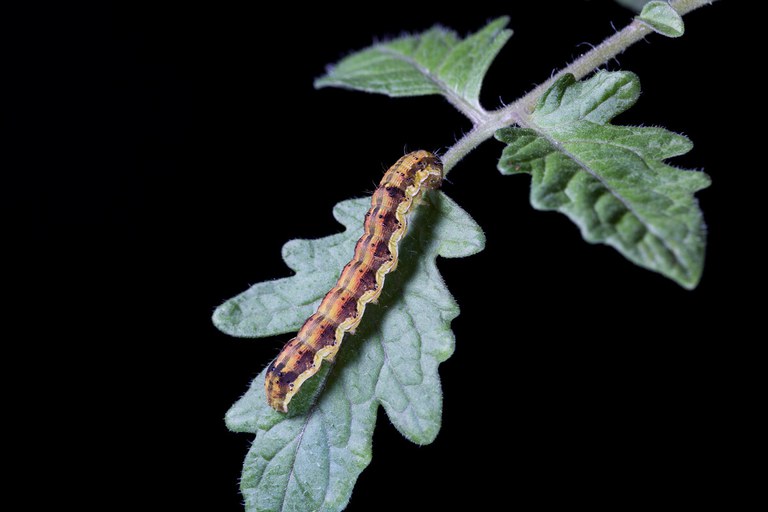Discovery of how insects trick plant defenses can guide management tactics.
Problem
Can a plant's natural defenses be leveraged to enhance protection against environmental stressors?
- Plants can protect themselves from insect herbivores by attracting natural enemies to damaged plants and alerting neighboring plants.
Findings
Tomato fruitworm caterpillars can silence host plant defense mechanisms, allowing the insect to devour the undefended plant. The researchers studied how the enzyme glucose oxidase, found in tomato fruitworm caterpillars' saliva, can affect plant stomata, which regulate leaf temperature, gas exchange, and water content.
- Using pharmacological, molecular, and physiological approaches, the researchers were able to show that this salivary enzyme plays a key role in insect-induced stomatal closure and likely the reduction of several important defensive emissions.
Impact
This study is the first to use CRISPR/Cas9-mediated gene editing to study the function of an insect salivary enzyme and determine a role in plant defense.
- This work uncovered a new strategy whereby an insect uses saliva to inhibit the release of airborne plant defenses through direct manipulation of stomata.
- The results yield insights into the abilities of crop plants to withstand additional stressors such as climate change.
Research Credit
Team
- Po-An Lin, Yintong Chen, Duverney Chaverra-Rodriguez, Chan Chin Heu, Nursyafiqi Bin Zainuddin, Jagdeep Singh Sidhu, Michelle Peiffer, Ching-Wen Tan, Anjel Helms, Donghun Kim, Jared Ali, Jason Rasgon, Jonathan Lynch, Charles Anderson, Gary Felton
Participating Departments
Partners
- Penn State Eberly College of Sciences
- University of California San Diego
- Texas A&M University
- Kyungpook National University
Competitive Funding
- National Science Foundation (NSF) (Plant-Biotic Interactions)
- NSF (Cellular Dynamics and Function)
- NSF (Enabling Discovery through GEnomics [EDGE])
- USDA NIFA (AFRI)
Federal and State Appropriations
- USDA NIFA Hatch Projects PEN04609, PEN04608, and PEN04732, Accession #1010058, #1010032, and #1021883
Emerging Discoveries
Published Research
Silencing the alarm: An insect salivary enzyme closes plant stomata and inhibits volatile release.
-
Lin, P. A., Chen, Y., Chaverra-Rodriguez, D., Heu, C. C., Zainuddin, N. B., Sidhu, J. S., Peiffer, M., Tan, C. W., Helms, A., Kim, D., Ali, J., Rasgon, J. L., Lynch, J., Anderson, C. T., & Felton, G. W. (2021). Silencing the alarm: An insect salivary enzyme closes plant stomata and inhibits volatile release. New Phytologist, 230(2), 793-803. https://doi.org/10.1111/nph.17214
Office for Research and Graduate Education
Address
217 Agricultural Administration BuildingUniversity Park, PA 16802-2600
- Email agresearch@psu.edu
- Office 814-865-3136
Office for Research and Graduate Education
Address
217 Agricultural Administration BuildingUniversity Park, PA 16802-2600
- Email agresearch@psu.edu
- Office 814-865-3136



